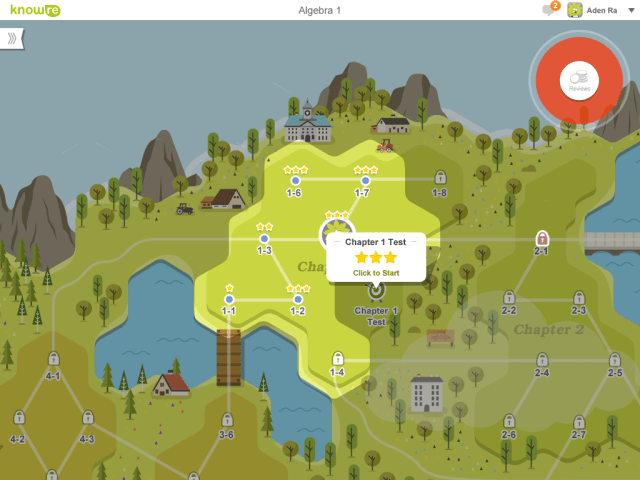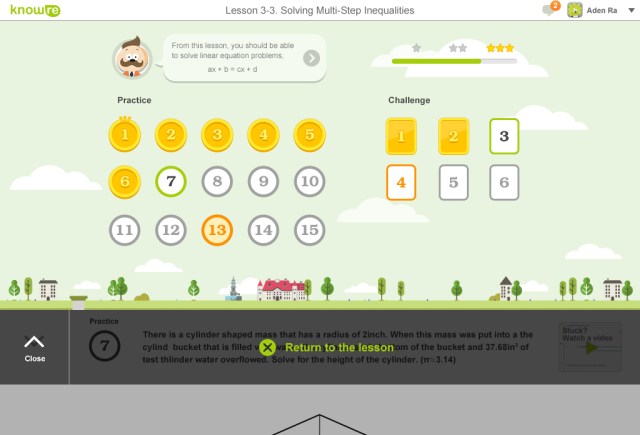As the educational landscape changes, it is giving birth to a whole new generation of learning software and learning software companies. In part, this change is being driven by the introduction of “adaptive” technologies, which, writ large, seek to personalize the learning process for each student. By personalizing the education experience, these new platforms hope to improve student outcomes, allowing each student to learn at his or her own pace and providing a much-needed helping hand for teachers who find themselves managing a classroom full of students at very different points in their learning paths.
Startups like NoRedInk have created adaptive learning tools to help students improve their grammar and writing skills, while old and new publishers like McGraw-Hill, Pearson and Boundless are developing adaptive textbooks and learning platforms to help students study more effectively, regardless of the subject.
Today, another startup is officially entering the adaptive learning space, but, like a foil to NoRedInk, it’s tackling the mathematical side of education. KnowRe, a product of the first batch of startups out of Korean-American business accelerator SparkLabs, is developing an online adaptive learning service for K-12 mathematics. Gearing up for its launch in the U.S. later this quarter, the startup announced today that it has raised $1.4 million in seed funding from SoftBank Ventures.
Founded by a team of Korean-American educators and engineers, KnowRe is on a mission to personalize the learning process in Mathematics. Beginning on familiar ground, the platform offers a series of question-and-answer sessions, which students can interact with as they normally would. As they answer questions, KnowRe assesses students’ individual strengths and weaknesses and serves them with individualized curricula that adapt in realtime as they progress through each lesson.
At the core of KnowRe, says co-founder David Joo, has been the mission not just to digitize math content and lessons, but to actually digitize mathematical concepts. The platform’s algorithms create new permutations for each lesson, so, while the numbers in a problem may change, the module (or concept) at the heart of the lesson becomes a sensor for recording what a student is understanding.
“It’s what we like to call a knowledge matrix,” Joo says, as this process allows the platform to break down each concept and lesson into its individual components, five, ten, or 14 — however many the lesson happens to contain. This, in turn, allows KnowRe to better assess which part of fundamental mathematical concepts they’re getting hung up on and vice versa. The idea, in the end, is to provide students (and their teachers) with a more granular sense of what a student is understanding.
The platform is intended to be used either by students as part of homework assignments or in tandem with tutors and educators during class. The other appeal of the platform is that it works right off the bat, adapting to students’ pace in realtime from the get-go, rather than forcing students to spend a month answering questions (and gathering data) before offering any insight into their learning paths.
By breaking down fundamental math concepts into five separate (but linked) components, students only have to answer a few questions before KnowRe begins producing dozens of assessable data points. In turn, the value prop for teachers, the co-founder says, is that they don’t have to manually populate (and then analyze) a question or problem bank, instead using its algorithms to randomly generate various problems and questions (different numbers, or variations in an equation, for example).
Once it collects the necessary data, the platform then automatically builds a review sheet for students, based on the content they’re failing to grasp. The other cool aspect of it is that most adaptive learning platforms fail to give adequate attention to the quality of the student’s learning experience, focusing solely on the personalization piece. KnowRe starts its lessons with a cartoon and offers a number of different gamification elements throughout that aim to keep students engaged and having at least an ounce of fun while doing their homework (and presumably raising their grades).
While the startup is pre-revenue and doesn’t expect to launch its open beta until later this quarter, Joo says that the founders see two potential revenue streams down the road. First, a student-facing tool that runs seamlessly in the background during exercises and serves personalized curricula as well as premium, paid features, and, second, a learning management system that gives the teacher more control over the process, allowing them to assign quizzes, homework, see how each student is understanding the material, on a student-to-student or class-to-class basis. Essentially, both a B2C and B2B approach.
The startup, which is based both in New York City and Seoul, initially planned to target the U.S. 7th grade-and-up market but the co-founder said that it has been approached by several of the largest education companies in Korea and will be collaborating on an adaptive learning product for both the Korean and Asian markets as well. Whether that will push back the launch of its product in the U.S. remains to be seen, but for now, the startup is far from being short on potential opportunities.
“We took our years of experience as math instructors and running a math academy in Seoul, South Korea to digitalize our offline methodology,” says KnowRe co-founder and CEO YJ Kim. “Our focus has always been to discover students’ weaknesses and help them resolve the problems they face when learning tricky mathematical concepts.”


